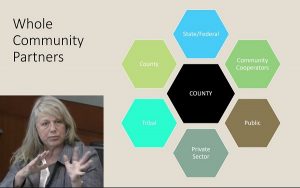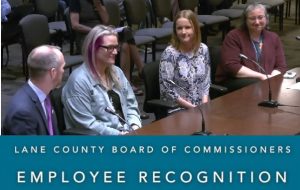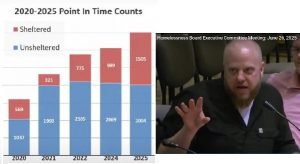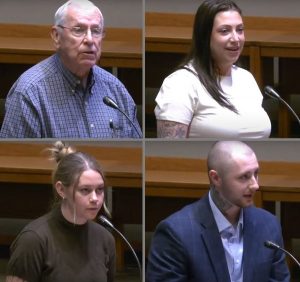City council sets priorities for 2023 legislative session
11 min read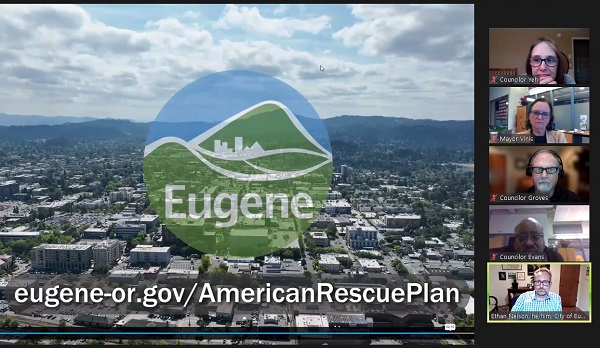
Unhoused response, infrastructure, and behavioral health services top Eugene’s funding priorities for the next legislative session. The city council’s IGR (intergovernmental relations) Committee met Dec. 7.
[00:00:10] Ethan Nelson: For the record, Ethan Nelson, I’m the City of Eugene intergovernmental relations manager. Here are the top five funding projects that we as an organization identified:
[00:00:20] Number one, we’re going to ask for $7.5 million from the state to support unhoused response. Last legislative session, we received $5 million. We’re asking for the same type of funding for availability and use except we’re increasing it, because that roughly equates to half of what the FY23 expenditure for unhoused response is for the city. It’ll dovetail on into the Oregon Mayors Association and the request from cities for direct funding.
[00:00:50] Clear Lake Road infrastructure: Many of you know the UGB expansion, and there’s areas for industrial and economic development activities. There’s also the potential for a planned sports facility out at Golden Gardens Park, and another fire station out there just for service coverage. That expansion needs infrastructure.
[00:01:10] It’s roughly an $80 million project in (I think) up to three, potentially four phases. And right now we’re going to ask for $8.5 million dollars for phase one. And that’s going to be a lot of the infrastructure in that phase one area, as well as wastewater. It really aligns with where the legislature is right now, and likely going to have funds.
[00:01:31] Number three, the Crow Road infrastructure is similar. It’s in the urban reserves, and it’s an area that has been identified for housing production— a core priority for council as well as the state legislature. And I think our community identified that in a community survey. We’re requesting $4.1 million to extend infrastructure.
[00:01:51] And there’s a lot of bills that are really focusing in on housing infrastructure and housing production and ramping that on up. And so my sense is that there’s going to be funding associated with some of these bills related to housing production. We might be able to take these projects and add them into that bill.
[00:02:10] We’re going to look to request $2 million to upgrade between two and four community centers in Eugene to serve as clean air shelters. Many of our facilities were built in the ’50s -’60s, and were not necessarily built to withstand the smoke emergencies that we find ourselves having on a regular basis.
[00:02:28] And then the fifth one, the last one, is police body and dash cameras. So we’re replacing the system that EPD has, and we’re actually expanding it a little bit. And so it’s a $2.6 million project, so we’re trying to find a couple different pots of funding to go after for that.
[00:02:44] And so those are the top five.
[00:02:49] Councilor Greg Evans: Ethan, on item four, have we identified specific community centers where those upgrades are scheduled to happen?
[00:02:58] Ethan Nelson: We have not. Craig Smith, our recreation director, said we would look at a geographical distribution that’s provides equity across the community in addition to the ones that are going to be utilized the heaviest and probably need the most assistance and work.
[00:03:12] Mayor Lucy Vinis: I’m really glad to see the Clear Lake Road infrastructure on this list because it feels like that’s been a huge barrier to any development out there. So I’m really glad to, glad to see this at the top of the list.
[00:03:26] Councilor Randy Groves: Mayor, I’m really glad to hear you say that ’cause, yeah, Councilor Evans, you know as well as I do, with some of the conversations we’ve been having with companies that are actually looking at possibly locating here. One of the things is when they say go, they’re thinking like nine to 12 months and they’re up and running.
[00:03:42] So having some shovel-ready sites, that’s one of the ways we’re going to climb out of our financial hole is to have some responsible economic growth. So thank you for recognizing that and I, I really hope we can champion some of that work.
[00:03:58] Ethan Nelson: Mayor Vinis has been serving on the state of Oregon’s Resilient and Efficient Buildings Task Force. It’s been a lot of work, a lot of meetings every other week for about six months and came up with recommendations for legislation to move into the 2023 season, nine different items. And the top three are ones that I have identified and I would recommend us to put as our state priority.
[00:04:23] Number one is promote, incentivize or subsidize. And so that means bring funding to these programs. Number two, promote, incentivize or subsidize heat pumps. That means bring money to these. And number three is decarbonize institutional public buildings.
[00:04:38] So the top three would be in that priority document, which is what I’m going after and I’m going to spend a lot of time on, and the other ones are already within our planning document, our policy piece.
[00:04:53] Mayor Lucy Vinis: I’ve mentioned my service on this task force to all of you and how excited I am by these final recommendations ‘cause they really do support our work and the work that we have done puts us in a good position to line up for these funding opportunities.
[00:05:07] This is really such a great opportunity for us to already be poised with a Climate Action Plan that we’ve approved and a decarbonization roadmap that we’re looking at. It just ties it all together.
[00:05:17] Ethan Nelson: And Mayor, do you want to just talk a little bit about the EPA?
[00:05:22] Mayor Lucy Vinis: Thank you, Ethan, I’m happy to do that. The Local Government Advisory Committee for EPA has been looking specifically at how those Inflation Reduction Act funds could most effectively be used, what barriers we have, what priorities we have around how those funds could be used. Those are funds that can be used for this kind of energy efficiency, weatherization, upgrades of appliances.
[00:05:45] We’re kind of positioning ourselves at all three levels of government—what we’re doing locally, what we’re advocating for at the state, and the recommendations we’re making at the federal level—to make sure there’s a clear pathway for cities all over the country to be able to make the most of those federal dollars.
[00:05:58] Ethan Nelson: Thank you, Mayor. EPA will take that into consideration as they write their rules within, I think, a January timeframe and opportunities for funding by mid-February. So it’s a really, really quick turnaround, and they’re pushing out around $27 billion within a two-year period.
[00:06:15] Ian Penn, who’s our sustainability manager, has been working with us on this. And so all of this work at the state and the federal level, related to going out and trying to secure incentives and subsidies for energy retrofits and carbon reduction, are part of what we’ve been working on.
[00:06:31] John Q: Councilors asked about funding to address behavioral health issues on the streets.
[00:06:38] Ethan Nelson: The direction from some of the councilors was: We want to know more about behavioral health updates and what are we really looking at?
[00:06:45] And so I’ve been doing a lot of research and talking with individuals, and we’ve been having different meetings with OHA and others to really try to understand the landscape of behavioral health and where it is now, where it’s likely to go, and some of the policy issues that come into that sector in that frame.
[00:07:06] So number one is, to allow cities as eligible entities for direct funding for providing mobile crisis response services. So this is CAHOOTS. We know that $1 million goes on out each year from EPD (Eugene Police Department) — $1 million plus—for EPD to run CAHOOTS. We are not statutorily required to provide that service. Lane County is. And yet we don’t have access to the funding that Lane County has access to.
[00:07:33] So this is a big one. We’ve got a bill drafted that Sen. (James) Manning put forward for us. And U.S. Sen. Wyden and his staff are very, very supportive of this because they have passed CAHOOTS legislation, is what they’ve called it. And they put that forward with the intention that funding would make its way to City of Eugene, and right now it can’t, there’s not a pathway for us to access federal and state dollars for reimbursement or even just direct funding. So that’s what that one’s about.
[00:08:02] The Oregon Health Authority, they’re proposing $340 million expanding 988 call center capacity and providing access to crisis stabilization centers across Oregon. So when Lane County has issued their interest to get funding for a crisis stabilization center, this is most likely the vehicle that that funding would be allocated. It’s moving forward, but it won’t move until Gov.-elect Kotek puts together her recommended budget and delivers that in January.
[00:08:33] Then the last one, number three, is payer parity for behavioral health crisis services. That’s important because many times insurance companies won’t pay at the rate that the service is being provided at. You are being reimbursed at 70 cents on the dollar, or something in that nature. And so this would mandate that insurance—and including Medicaid for Oregon Health Plan—pay for at the rate that the services, are close to the rate that the services are being paid for.
[00:09:03] (Eugene Springfield Fire) Chief (Michael) Caven, he’s really supportive of this because it not only applies to CAHOOTS but it also applies to reimbursement for transport. So that one’s really important for us. And so all three of these are really about funding that would come to directly to the city or funding for expanded services within our community.
[00:09:22] There’s two more. And these would then be in the, not in the priority document, but these would be additions to the policies document.
[00:09:32] Eugene supports legislation that accelerates the implementation of and increases the transparency of Ballot Measure 110’s addiction treatment services centers. Additionally, Eugene supports legislation that creates incentives for offenders to seek treatment.
[00:09:46] And what we are going to be working on is really narrating with the committee, the impacts that we’re seeing from a community level and really trying to educate. And then from there, likely be able to get some legislation that might be able to address that ‘incentives’ for offenders to seek the treatment.
[00:10:06] And so those will be working with League of Oregon Cities and probably Association of Counties taking the lead on those ones at this point. But that gives us direction on fixing the treatment side and getting that money, but then also on the enforcement piece and providing the incentive for folks to get in and seek treatment.
[00:10:25] Councilor Greg Evans: This is excellent work, Ethan. It really kind of helps focus us on what are some of the remedies to some of our behavioral health issues that we’re currently facing in the community, which is right now pretty overwhelming.
[00:10:42] Councilor Randy Groves: I concur and I mean, I certainly recognize that behavioral health is a county function, but we certainly have a dog in the fight.
[00:10:51] Councilor Greg Evans: I’ll ask the mayor to chime in and maybe give us a brief update on the Mayors’ Task Force on Homelessness.
[00:11:02] Mayor Lucy Vinis: The Oregon Mayors Association with the leadership of the League of Oregon Cities has reached out to Gov.-elect Kotek asking for a meeting. Ninety-one of 241 Oregon cities have now signed on to this request. And this dovetails with the $7.5 million request, half of what the city is expending, as Ethan says.
[00:11:25] We’re also not totally dependent on that Oregon Mayors Association ask, in order to really be able to make our own case for the funding we have, because we are—Eugene is in a very strong position to make this request because we’ve done such good work. We spent it, we have metrics to show for it.
[00:11:44] You know, we made a strong case to the governor-elect, several of us. I did a lot of things to stand up to support Tina as she was running, with the idea that I’d have her ear when I really wanted her ear. And there were a number of us mayors who supported her in a press conference around this OMA request.
[00:12:01] You know, this is the challenge of our era. But I actually think that as challenging as this has been to get all these different size cities with different perspectives to come together with a single ask, it’s pretty well orchestrated and we’re in a pretty good position to make that ask.
[00:12:17] Councilor Greg Evans: Yeah, thanks, Mayor, for all your work on this. Occasionally I end up running across Mayor (Steve) Callaway in Hillsboro. And he is always complimentary of the work that you and our staff do around the homelessness issue and the collaborations that we continue to have with the other cities to try to solve our houselessness and homeless issues.
[00:12:41] John Q: The city will be closely watching one lawsuit that pushes back against unfunded mandates.
[00:12:47] Ethan Nelson: So on Climate-Friendly Equitable Community, I wanted to just give an update. So on the 21st of November, 13 Oregon cities, Marion County, they submitted an appeal against DLCD (Department of Land Conservation and Development). And what they seek via the lawsuit, is pausing the implementation of the current rules and requiring the DLCD go back to the table with local governments. And the court of appeals let the plaintiffs know that they’ll have a decision by the end of this month.
[00:13:11] John Q: Ethan said the city should expect more unfunded mandates from the state.
[00:13:15] Ethan Nelson: A researcher from Sightline Institute said how housing policy statewide has actually worked. And one of the takeaways was that much of housing policy gets gummed up at the local level because of politics and not being able to move things at the local level. What the legislature has done—and he used House Bill 2001 as an example—is to say, ‘Look, in this instance you told local governments either you take control and do it your way or you adopt the state’s way.’
[00:13:50] And what he highlighted is, he said, most of the communities that adopted their own rules in (HB) 2001 went above and beyond what the minimum was. So we’ve heard that in Eugene, we’re going above and beyond. We’re not alone in that area.
[00:14:05] And so he made that case. And I share that because of what you’ve articulated today, a frustration that the state is mandating things that then we have to jump to. And that I don’t think is going to change, and I foresee more of that this year.
[00:14:21] Councilor Jennifer Yeh: I agree with your assessment, I think that what people got out of it, was that it was effective, right, that (HB) 2001 was effective, and so therefore we should do that again. So if we’ve already lost that battle, then maybe our strategy should be more that, ‘Fine. If you’re going to make us do something, it needs to come with support.’ Because really, if we had support so that we had more staff, it wouldn’t be as much of a burden.
[00:14:50] Ethan Nelson: Fortunately, a lot of the discussion that’s happening at the legislature right now is also including an understanding that when the state moves forward, they need to assign resources, that they can’t just say, ‘Thou shalt’ an unfunded mandate, but they actually have to fund it.
[00:15:05] John Q: Ethan also previewed a city-made video that shows how Eugene spent its federal funding. The legislative session starts Jan. 17.
